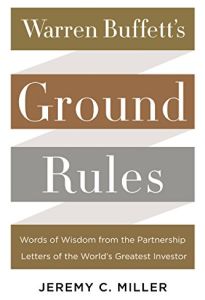Join getAbstract to access the summary!

Join getAbstract to access the summary!
Jeremy C. Miller
Warren Buffett's Ground Rules
Words of Wisdom from the Partnership Letters of the World's Greatest Investor
HarperBusiness, 2016
What's inside?
Warren Buffett’s letters show that the basics of wise investing persist from decade to decade.
Recommendation
For consistent success in volatile markets, it’s hard to beat Warren Buffett. Authors trying to unlock the Oracle of Omaha’s secrets have written shelves full of books. This compilation proves a welcome addition to the canon. Investment manager Jeremy C. Miller dives into Buffett’s correspondence from the 1960s. He finds that Buffett has followed the same common-sense principles for decades. The letters date back to when Buffett managed relatively small sums, so his strategies are more relevant to individual investors than his more recent moves are. Miller argues that Buffett’s investing strategy includes nothing flashy or complicated – his genius is in making sound investment decisions again and again. getAbstract recommends Miller’s analysis of Buffett’s early letters to investors looking for insight from one of the all-time greats.
Summary
About the Author
Jeremy C. Miller is an investment analyst for a mutual fund company and a 15-year veteran of the financial industry.


















Comment on this summary